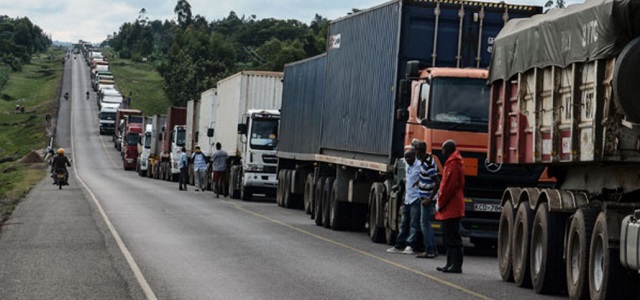
Experts, government suggest ways to easing trade among partner states
Kampala, Uganda | JULIUS BUSINGE | There is a growing concern amongst the business community that the COVID-19 lockdown measures are a danger to business activities, and if not carefully eased, could make the situation worse going forward.
This is the matter that came up on June 23, at the post East African Community tax and budget dialogue for FY2021/2022 held in Kampala in which participants suggested ways of easing trade during these tough times so as to keep the economy as a going concern.
Jane Nalunga, the executive director at SEATINI Uganda said, EAC countries still operate dissimilar tax policies which defeats the whole essence of the EAC Customs Union which provides for the Common External Tariff (CET) as one of the pillars.
“There is need to revisit the code of conduct and institute a committee to report on tax harmonisation in the EAC region,” Nalunga said.
She added that gaps in the implementation of CET raises the appetite to smuggle goods especially if one country has differing tax rates.
Abel Kagumire, the commissioner for customs at Uganda Revenue Authority and Moses Kaggwa, the acting director economic affairs at the Ministry of Finance partly agreed but said steps were being made to deal with this challenge.
“Tax harmonisation as a region is very important but because we are at different levels of development as partners, it becomes difficult,” Kagumire said.
However, he added that, in the spirit of EAC, URA has already partnered with Kenya Revenue Authority to host servers of the regional electronic cargo tracking system to aid tracking of goods from Mombasa through Uganda to Rwanda, South Sudan and DR Congo to facilitate trade in the region.
“Harmonisation means having similar tax principles and laws; we are fairly together with the rest of the EAC,” Kaggwa said. He added that Uganda copied the VAT that Kenya implemented and brought it into Uganda, then Rwanda and Tanzania followed suit.
Officials said, as countries implement tax harmonisation, there is need to consider the possibility of having centralised revenue administration, collection.
“When we harmonise our tax administration we shall not compete with each other as EAC member states,” Kagumire said.
Non-tariff barriers
In a speech, Patrick Ocailap, the deputy secretary to the treasury and acting permanent secretary/secretary to the treasury said, whereas trade among the partner states does not attract tariffs, non-tariff measures have increasingly been adopted, which have the effect of reducing intra-regional trade.
“We are all aware of the recent barriers that Ugandan goods have faced in accessing some countries,” he said in reference to Kenya and Rwanda.
Ocailap said, the EAC Sectoral Council on Trade, Industry, Finance, and Investment (SCTIFI) has urged the EAC Regional Coordination Committee (RCC) on Covid-19 to review and harmonise the Covid-19 testing charges, validity, and mutual recognition of the certificates with a view to ensure safe and smooth movement of goods and persons in the region.
He said SCTIFI also directed the Republic of South Sudan and the Republic of Uganda to operationalise the Nimule/Elegu One Stop Border Post (OSBP) by having all relevant officials operating from the OSBP.
It has also directed partner states to use regional structures such as the EAC standards committee to resolve matters amongst themselves other than taking unilateral interventions.
The Republics of South Sudan, Uganda, and Kenya have also been directed to expedite the removal of visa fees among themselves, and directed the EAC partner states to remove all discriminatory fees, levies, and charges of equivalent effect inter alia.
Ocailap said, a meeting of the EAC Council of Ministers has not been convened thus far, but the EAC pre-budget meeting and the Sectoral Council on Trade, Industry, Finance, and Investment has met and made recommendations.
He is optimistic, going by past experiences that the recommendations will be passed by the Council of Ministers.
In this regard, he said, Uganda has proposed to maintain protective rates ranging from 25% to 60%, instead of 0%, 10% and 25% on goods manufactured in Uganda, for a period of one year.
These are majorly products where Uganda has a competitive advantage, and they include; meat and edible meat offals, fresh or chilled potatoes, sausages and similar products, chewing gum, other sugar confectionery (sweets), chocolates, biscuits, tomato paste and sauce, honey, ready to drink juices, ginger, jams, processed tea and coffee.
In addition, they have proposed to extend duty remission for essential inputs used by manufacturers, under the EAC Duty Remission Scheme.
These inputs are taxed at reduced duty rates (0% or 10%) for a period of one year. The normal rates are usually 10% or 25%. This is aimed at reducing the cost of inputs and hence the cost of doing business in Uganda.
Some of these inputs include those that are used in the manufacture of textiles, footwear, and assembly of motorcycles, among others.
The sectoral council decided that equipment used in the manufacture of textiles and footwear which do not qualify for remission of duty under Section 140 of the East African Community Customs Management Act, 2004 be granted a stay of application up to June 30, 2022.
 The Independent Uganda: You get the Truth we Pay the Price
The Independent Uganda: You get the Truth we Pay the Price



